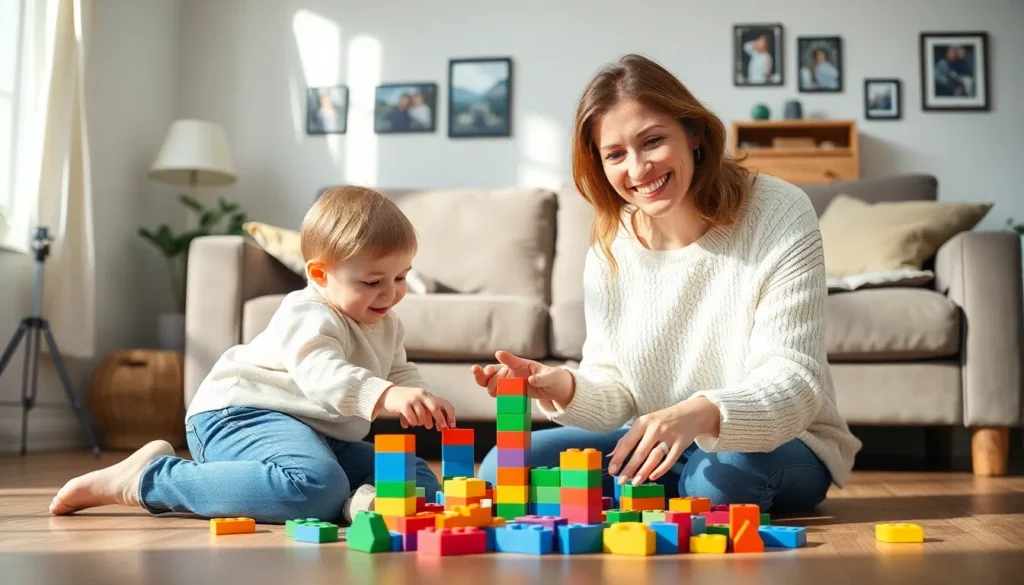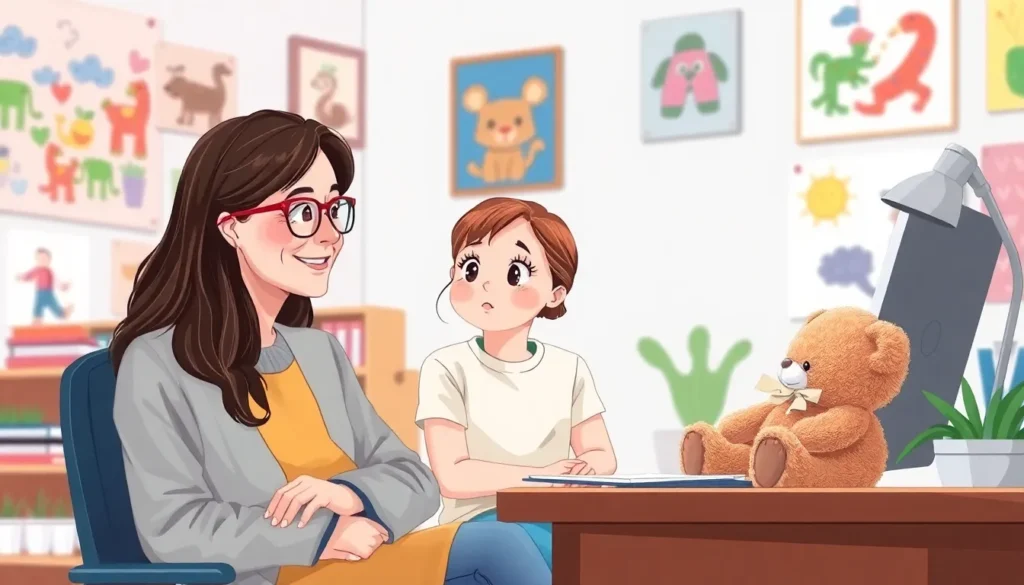Table of Contents
ToggleNavigating the world of childhood mental health can feel like trying to solve a Rubik’s Cube blindfolded. Parents often find themselves overwhelmed, unsure of where to turn when their little ones face emotional hurdles. Enter the child psychiatrist, the superhero in scrubs ready to save the day—minus the cape, of course.
Overview of Child Psychiatrists
Child psychiatrists specialize in diagnosing and treating mental health disorders in children and adolescents. These professionals possess expertise in understanding how mental health impacts overall development and functioning. Providing comprehensive assessments, they create tailored treatment plans suited to individual needs.
Capabilities of child psychiatrists include medication management, psychotherapy, and behavioral interventions. They collaborate with families, schools, and other healthcare providers to ensure a holistic approach. Establishing a supportive environment helps children feel safe while discussing their feelings.
Education and training for child psychiatrists involve completing medical school followed by a residency in psychiatry. Afterward, additional fellowship training in child and adolescent psychiatry is undertaken. This extensive education equips them with the necessary skills to address complex mental health concerns.
Many families seek help from child psychiatrists for issues like anxiety, depression, ADHD, and autism spectrum disorders. Immediate support often leads to significant improvements in emotional well-being. Early intervention tends to create positive outcomes for children facing mental health challenges.
Practicing child psychiatrists use evidence-based approaches to monitor progress and adapt strategies. Regular follow-ups allow for adjustments in treatment as needed. Open lines of communication between psychiatrists and families enhance understanding of the child’s condition and treatment effectiveness.
Connecting with a child psychiatrist can be a pivotal step for families. Many individuals experience relief when accessing professional support tailored to children’s unique needs. Guidance from these experts empowers parents to navigate the complexities of childhood mental health challenges.
Qualifications and Training

Child psychiatrists undergo rigorous academic and practical training to effectively support children’s mental health. This training process includes several key steps, each critical to their expertise.
Educational Requirements
Completion of a medical degree forms the foundation of training for child psychiatrists. After earning a Doctor of Medicine (MD) or Doctor of Osteopathic Medicine (DO), graduates enter a residency program in general psychiatry, lasting four years. Specialization in child and adolescent psychiatry occurs during a subsequent fellowship, which typically spans two years. This extensive education prepares psychiatrists to diagnose and treat varied mental health disorders in young people.
Licensure and Certification
Child psychiatrists must obtain medical licensure to practice legally. This involves passing the United States Medical Licensing Examination (USMLE) or the Comprehensive Osteopathic Medical Licensing Examination (COMLEX). Additionally, board certification in psychiatry and child and adolescent psychiatry requires successful completion of examinations administered by the American Board of Psychiatry and Neurology (ABPN). Certification demonstrates their commitment to maintaining high standards in clinical care and ongoing education.
Common Conditions Treated
Child psychiatrists address various mental health conditions in children, often focusing on issues that significantly impact development. This section highlights some of the most common disorders encountered in their practice.
ADHD
ADHD stands for Attention Deficit Hyperactivity Disorder, characterized by inattention, hyperactivity, and impulsivity. Children diagnosed with ADHD struggle to maintain focus on tasks, follow instructions, and regulate their behaviors. These challenges can severely affect academic performance and social interactions. Treatment often includes behavioral therapy, parent training, and, when appropriate, medication management. Child psychiatrists emphasize the importance of creating an organized and supportive environment, which can significantly aid in managing ADHD symptoms.
Anxiety Disorders
Anxiety disorders encompass a range of conditions, including generalized anxiety disorder, social anxiety disorder, and separation anxiety. Symptoms often involve excessive worrying, fearfulness, and physical manifestations like stomachaches or headaches. Young people may experience heightened distress in social situations or separation from caregivers. Treatment plans typically combine therapy techniques and, if necessary, medication. Child psychiatrists utilize cognitive-behavioral therapy to help children develop coping mechanisms and alleviate anxiety symptoms effectively.
Depression
Depression in children can manifest differently than in adults, often showing up as irritability, withdrawal, or changes in appetite and sleep patterns. Persistent sadness or loss of interest in activities are key indicators that children may be struggling. Early identification is crucial, as untreated depression can lead to severe consequences. Treatment usually involves psychotherapy, with options ranging from talk therapy to play therapy, and may include medication for more severe cases. Child psychiatrists aim to provide a nurturing environment where young individuals can openly discuss their feelings, fostering recovery and resilience.
Therapeutic Approaches
Child psychiatrists utilize various therapeutic approaches to address mental health issues effectively. These methods ensure that treatment aligns with each child’s unique needs and circumstances.
Medication Management
Medication management remains a vital component of treatment plans. Psychiatrists assess each child’s specific symptoms and overall health to determine appropriate medications. They monitor for effectiveness and possible side effects, adjusting dosages when necessary. Frequent reviews of the child’s progress help optimize outcomes. Families receive guidance on medication routines, ensuring compliance and understanding. Communication between the psychiatrist and family enhances the overall management of the child’s condition.
Psychotherapy Techniques
Effective psychotherapy techniques form another key strategy in treating childhood mental health disorders. Approaches such as Cognitive Behavioral Therapy (CBT) help children develop coping skills and challenge negative thought patterns. Play therapy utilizes creative expression to facilitate communication in younger children. Dialectical Behavior Therapy (DBT) addresses emotional regulation and interpersonal relationships. By combining these techniques with medication when necessary, child psychiatrists foster environments where children feel safe and understood. As a result, families notice significant improvements in emotional well-being and resilience.
The Role of Parents and Caregivers
Parents and caregivers play a critical role in addressing childhood mental health issues. Understanding the complexities of a child’s emotional challenges requires effective communication and collaboration. Active involvement with child psychiatrists enhances treatment outcomes, as families provide essential insights into the child’s behavior and experiences.
Recognizing signs of mental health issues is vital. Parents often identify changes in behavior, mood, and academic performance, prompting them to seek professional help. Open dialogue about feelings fosters a supportive environment that encourages children to express their concerns.
Collaboration with child psychiatrists leads to tailored treatment plans. Parents contribute by sharing their observations, which help psychiatrists design effective interventions. Participation in therapy sessions can also benefit families, offering them tools to better support their child.
Encouraging consistency in treatment is key. Adhering to prescribed medication and therapy schedules helps children maintain progress. Families often find that regular follow-up appointments and check-ins with the psychiatrist remain essential for monitoring the child’s development.
Additionally, caregivers foster coping skills at home. Engaging in activities that promote emotional expression, such as art or play, can enhance a child’s ability to process feelings. Establishing routines provides stability, which significantly benefits children facing mental health challenges.
Connecting with support groups offers further assistance. Many families find comfort and guidance in sharing experiences with others navigating similar struggles. Understanding they’re not alone empowers parents and caregivers to advocate effectively for their children’s mental health needs.
Active participation, communication, and collaboration between parents, caregivers, and child psychiatrists contribute to successful outcomes in childhood mental health. Prioritizing these relationships creates a nurturing environment, vital for fostering emotional well-being.
Child psychiatrists play a vital role in navigating the complexities of childhood mental health. Their expertise not only aids in diagnosing and treating various disorders but also fosters a supportive environment for children and families. By emphasizing collaboration with parents and caregivers, these professionals ensure that treatment is tailored to each child’s unique needs.
Through effective communication and evidence-based strategies, child psychiatrists empower families to address emotional challenges and promote resilience. As awareness of childhood mental health continues to grow, the importance of seeking help from child psychiatrists cannot be overstated. Prioritizing mental well-being in children lays the foundation for healthier futures.







